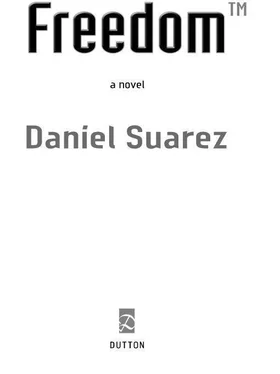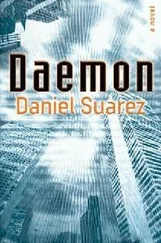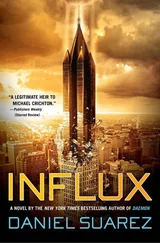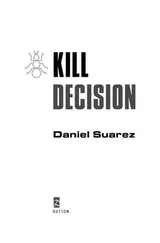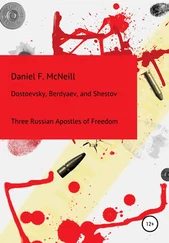“We’re too late.”
Dozens of plainclothesmen brandishing weapons poured through the front door of the high-end bar, creating chaos inside. The camera jerked, then zoomed out a little.
“Yeah, they’ve gone in.”
One of the suits near the wall spoke loudly. “We might still get a shot when they bring him out.”
Fulbright cast a glance to Philips. She was watching the screen. Numb.
“If we miss him, let’s see if we can track what prison they take him to.”
Philips was familiar with this math—“cruel calculus” is what Fulbright had called it. For the first time in her life, she was getting sick of math.
“We’ll use a private asset to take care of it.”
“We need to make sure we don’t lose track of him in the transfer—”
Someone on the control board called out again. “Something’s going on there, sir.”
Everyone looked up onto the screen to see plainclothesmen pouring out into the street again, looking frantically all over. Some were talking on radios.
“Looks like they still don’t have him.”
“Only half of them came out.”
“Maybe there was a shoot-out?”
“Did we have confirmation that Ross was in the building?”
“Yes, sir. Two informants confirmed it.”
The video image pulled back to show a dozen men frantically running into frame from either side of the bar building.
Two more black vans arrived, and tactical squads poured out of them with black body armor, helmets, and ballistic goggles. They brandished automatic weapons and were spreading out into the streets, shouting at people to lie down. The whole shopping area was coming under lockdown.
“Jesus Christ, they don’t have this guy.”
“They must have a hundred boots on the ground.”
“They’ve gotta find him now.”
“They’ve got two million surveillance cameras networked in that city. Believe me, they’ll find him.”
“Yeah, but our asset won’t be in place to take him out.”
Fulbright turned to Philips. “Thanks for coming in, Natalie. I’ll let you know if you’re needed again.”
She was still staring at the screen. “Yes, sir.”
On-screen the Chinese soldiers were still frantically talking on radios.
Philips exited the conference room, and then Ops Center 1. She walked down the bustling hallway outside, and ducked into the ladies’ restroom. She checked the stalls to see whether anyone else was present.
She was alone.
She entered the farthest stall, then closed and locked the door. She sat down and put her head in her hands. And then began to weep—her hands still trembling. As she felt the tears streaming silently down her face, she realized just how deeply she’d fallen in love with Jon Ross.
Hours later Shen Liang entered the unmarked Golden Shield Central Command facility in downtown Shenzhen. Although there were no guards or signs to mark the nondescript six-story block of windowless concrete, the moment Shen stepped through the mirrored sliding doors in the underground garage, he was met by a dozen heavily armed PLA soldiers waiting to either side of metal detectors. Security officers in dress uniform ushered him through the scanners.
What happened here was very important to the Party. Golden Shield was China’s sweeping program to create information systems to identify and contain dissent and subversive social elements that might threaten the country’s leadership—and thus the people of China. The GSCC building was the culmination of a multiyear, six-billion-dollar investment in internal security—which was itself just a pilot program for the much larger “Safe Cities Initiative,” which would link together all data moving through Chinese society, combining financial, communication, and street-level high-resolution CCTV images into a single software-driven internal security solution. Nothing like it had ever been attempted in the history of mankind, and it would serve as a model for security to be emulated around the world. Shen felt a tremendous sense of pride in yet another example of China’s technological prowess. He also told himself that it was necessary. Necessary to protect the Chinese people from themselves. Order must be maintained or imperialist forces would rob them of their destiny yet again.
As Shen moved through concentric rings of security, he looked up at the numerous camera and sensor domes that he knew even now were analyzing his face, his thermal image, his perspiration and respiratory patterns, all in an effort to determine if he was under emotional duress.
Outside in the streets, two million networked high-resolution CCTV cameras covered the entire city of Shenzhen. In 2006 the government had mandated that all Internet cafes and entertainment venues such as restaurants and bars install video cameras with a direct feed to their local police station. From there, the images were sent to a central cloud computing application that could apply any number of algorithms to the imagery and in turn alert local authorities to a wide array of suspicious behavior. People running, violent motion, sudden groupings of six or more people, flames. Then there was search: “the ten million face test” was used as the measure of facial recognition algorithms, and software was able to routinely spot and track Caucasian and dark-skinned people, or determine gender. The list was long and getting longer all the time. The state was acquiring eyes.
But then, Shen knew why it was necessary. The government was worried. There were roughly a hundred and thirty million migrants wandering China looking for work—the equivalent of nearly half the population of the United States, and all in a nation roughly equivalent in size to the United States. In fifteen years the number of migrants was projected to be three hundred and fifty million. Shenzhen was already a city with seven million migrant laborers out of a population of twelve million. And these migrants lacked the benefits of permanent citizens, such as subsidized health care and education. Their national ID cards showed their residency as linked to the rural villages where they were born—places where there was no work, giving them no choice but to head for the cities. And so a second class of citizen had been created: people desperate for work who had helped make this economic miracle possible—but who were increasingly angry at their circumstances. Particularly with the wealth that was evident all around them.
Was it fair? Shen knew it wasn’t, but he also told himself that there was no other way. How else could China become the world leader it was destined to be if not for this sacrifice? Unless someone bore the burden?
Shen hadn’t worked on Golden Shield, but his company had worked on secret modifications to router firmware. He did not doubt that those back doors were utilized throughout the system.
He eyed the camera and sensor arrays again.
He wondered if they detected his nervousness. He had promised his commanding officer, General Zhang, that he would be able to turn the fugitive, Jon Ross, to their side. But Shen had failed. The loss of their back doors in Western networks was still unsolved, and Shen knew that unless it was solved soon, many heads would roll. He hoped his would not be among them.
Jon Ross had known about the chipsets modified by the General Equipment Department—without the knowledge of Western client companies. If Ross knew about the loss of those back doors, then he must have been in on it. Shen was still wondering how on earth it could have been accomplished. America and Europe were not capable of sudden, sweeping changes across companies and borders—without so much as a peep in any e-mails. It seemed impossible.
Читать дальше
